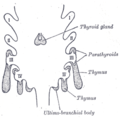Thymus
The thymus is a specialized lymphoid organ of the immune system. The thymus is in front of the heart and behind the breastbone.
In the thymus, T cells or T lymphocytes mature. T cells are critical to the adaptive immune system, where the body adapts specifically to foreign invaders.
The thymus is where T cells develop from hematopoietic (blood-forming) cells. In addition, this is where the T cells get tolerant to cells of the body.
The thymus is largest and most active during the newborn and pre-adolescent periods. By the early teens, the thymus begins to slow down. However, it continues to make lymphocytes throughout adult life.
Thymus Media
Micrograph showing a lobule of the thymus. The cortex (deeper purple area) surrounds a less dense and lighter medulla.
On chest X-ray, the thymus appears as a radiodense (brighter in this image) mass by the upper lobe of the child's right (left in image) lung.




